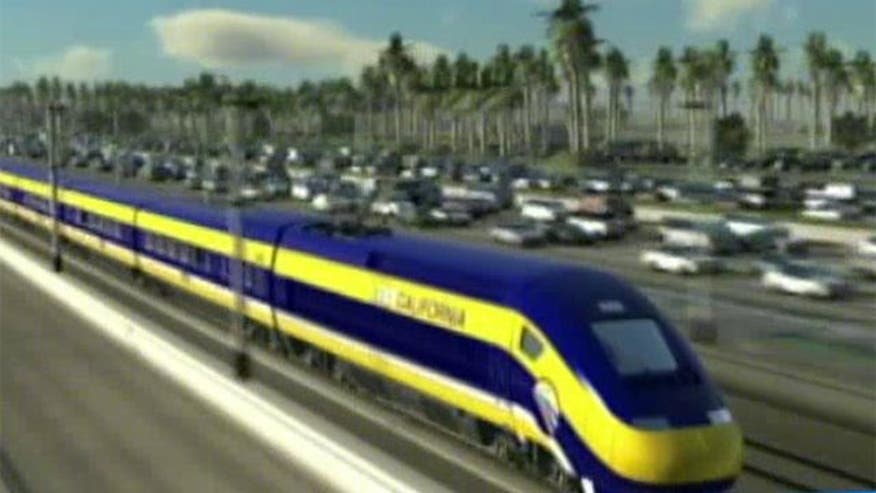
Despite cost overruns, lawsuits, public opposition and a projected completion date 13 years behind schedule, California Gov. Jerry Brown broke ground Tuesday on what is to become the most expensive public works project in U.S. history: the California bullet train.
Over the next 1,000 days, California is estimated to spend roughly $4 million a day on the project.
The high-speed train, set to be finished in 2033, originally was supposed to deliver passengers from San Francisco to Los Angeles in two hours and 40 minutes. That was the promise when voters narrowly approved $10 billion in bonds for the project in 2008. Since then, however, the estimated trip time has grown considerably, and the train has encountered persistent problems — as experts uncovered misrepresentations in the ballot proposition, and opponents sued to stop the project on environmental and fiscal grounds.
“We’re talking about real money here,” said Kris Vosburgh, executive director of taxpayer watchdog group Howard Jarvis Taxpayers Association. “This is money that’s not available for health care or education, for public safety, or put back in taxpayers’ pockets so they have something to spend. This is money being drawn out of the system for a program that is going to serve very few people.”
Much about the project has changed since it was sold to the public.
Voters were told the project would cost just $33 billion. Once experts crunched the numbers, however, the price tag soared to $98 billion. It was supposed to whoosh riders from Southern California to the Bay Area in less than three hours, but now it’s more than four hours due to changing track configurations and route adjustments. The train was supposed to get people off the freeway and reduce carbon emissions, but a panel of experts now says any carbon savings will be nominal.
Further, ridership projections have been cut by two-thirds from a projected 90 million to 30 million a year. Fewer riders means higher prices. According to a panel of transportation experts hired by the Reason Foundation, Citizens Against Government Waste and the Howard Jarvis Taxpayers Association, tickets will exceed $80 — not $50 — and the system will require annual subsidies of more than $300 million annually.
“The public has turned sour on this plan but the governor, to paraphrase Admiral Farragut, has taken a position of ‘damn the people, full speed ahead’,” Vosburgh said.
Undaunted by critics, Brown broke ground in Fresno on Tuesday on the first 29-mile segment of the train’s system. Under Brown’s direction, the California High Speed Rail Authority has gone to court to seek an exemption from an environmental quality law the state imposes on other projects but not this one. Brown also convinced the state Legislature to dedicate an annual revenue stream from the state’s carbon tax, to help pay for the bullet train.
“It’s a long project, a bold project and one that will transform the Central Valley,” Brown said Monday as he began his fourth and final term as governor.
Once construction begins, supporters say it will be harder to stop the project. Several lawsuits linger, but a bigger question concerns the money: Where will it come from? If every penny committed to the project is added up, the project is still more than $30 billion short. Republicans in Congress are vowing not to commit a dollar more than President Obama approved in 2012.
“For years now, Governor Brown and the high-speed rail authority have turned the idea of high-speed rail into a public albatross far beyond what Californians envisioned or voted for,” House Majority Leader Kevin McCarthy, R-Calif., said in a statement released Tuesday. “Sadly, today’s groundbreaking is a political maneuver. Supporters of the railroad in Sacramento can’t admit their project is deeply flawed, and they won’t give up on it despite the cost. But these political tricks are exactly what the American people are tired of and what the new Republican Congress is committed to ending.”
Supporters don’t see waste. They argue the project will reduce freeway gridlock, offer competition to air travel and provide an alternative to trucking freight.
Environmentalists also have opposed the project, suing and claiming the construction project would harm 11 endangered species and worsen air quality in the already dirty Central Valley. They lost when a federal judge ruled the project did not have to adhere to the state Environmental Quality Act, unlike other projects. Additional legal challenges remain, but supporters believe once the train leaves the station and ground is broken, there’s no going back.
“The legacy of the Brown family is that they have been big thinkers, but also big builders,” said Democratic state Assemblyman Henry Perea. “I think this is an opportunity for the legislature to step up, support Governor Brown. ”
Service is scheduled to begin in 2018 from Bakersfield to Merced.
William La Jeunesse joined FOX News Channel (FNC) in March 1998 and currently serves as a Los Angeles-based correspondent.

